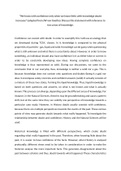Book review
Theory of Knowledge Essay Grade B (1 point to Grade A!) - International Baccalaureate
- Module
- Institution
This is my Theory of Knowledge Essay Grade B (1 point to Grade A!) on the International Baccalaureate. From a previous session, but useful to compare how to write a TOK essay and also serves as inspiration to possible essays and presentations! My essay title was: “We know with confidence only ...
[Show more]



